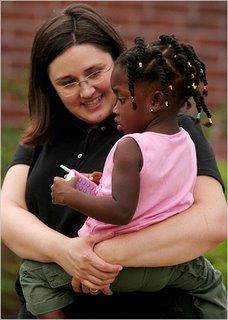White Folks, Black Babies
 From the NYTimes:
From the NYTimes:
Couple #1
A white judge initially denied Nick and Emily Mebruer’s petition to adopt a black child, ruling that the Mebruers, a white couple who live in rural Lebanon, Mo., were “uniquely unqualified” to parent a black child because of their limited interaction with black people and culture. The ruling was overturned, and their daughter, Maggie, is now 3.
Sorry guys, the judge was right!!! Thank God they're raising a daughter and not a son. Somehow girls are usually better equipt to handle emotional chaos without becoming complete social deviants. I don't care how nice they are, in a country where 12% of the population is black, there's no reason to raise a black child in a community that is 95.99% white (0.9% black). No excuse! They need to sell their house/farm and move somewhere where that kid can connect, at an early age, with other people that look like her. (The same would apply if the kid were Asian. What they're doing is just dumb.) Maybe they'll figure it out when she gets too old to wear her hair in pigtails and NO ONE for miles and miles knows how to do her hair IF she doesn't have a nervous breakdown before then. Score 0/10
Couple #2
When Martina Brockway and Mike Timble, a white couple in Chicago, decided to adopt a child, Ms. Brockway went to an adoption agency presentation at a black church to make it clear theywanted an African-American baby....Ms. Brockway worked for years in predominantly black schools and now tutors children in foster care. Mr. Timble, who owns a promotional printing business, has a cousin who has adopted four black children. They live in an ethnically diverse section of northwest Chicago. But after working through the adoption process, Ms. Brockway said, they are considering moving to a neighborhood with more black professionals and finding a more diverse church.
So, they look like white-bread-with-the-crust-cut-off in their photo but at least they know some black people and they live in Chicago, not around it, not near it. They're familiar with urban culture. The vast majority of black people in America live in an urban environment--thus the ever-so-sneaky-overly-PC use of "urban" as synonymous with "black"--so at least their child will have the benefit of that. They also seem to be aware of the challenges ahead and are considering lifestyle changes to remedy that. Score 7/10
Am I being mean? I don't think so. The best preparation anyone can have to raise a black child is to grow up in the midst of black people for two reasons: 1) most white people have no idea what it feels like to be a minority, much less black in America, 2) there are nuances of culture--songs, words, foods, styles--that can only be learned firsthand. They are absorbed by osmosis as they are experienced and they serve as unspoken connections between people of similar background.
Some people would probably say I place too much emphasis on culture, but I don't think so. I can tell you personal stories of my own ostracism over not being stereotypically "black" while having been raised with two black parents. Or one Filipino kid I know who was raised by white folks in rural Iowa who didn't know he was Asian until he got in the military. Nice! Or my biracial roommate in college who lived in a one-stop-light Ohio town and only saw other black people on vacation. Despite the fact that she's about Halle Berry's complexion, with curly brown hair, unlike the one "Spanish girl" at school, she never had a date. "But you're black," the boys said. Or the Korean girl I met in college who when questioned about her ethnicity could only offer a blank stare because her adoptive parents hadn't thought it was important to prepare her for that particular aspect of life apart from the world of insulation they had created for her.
It's bad enough to not know who your parents are but this is taking alienation to another level. I can't begin to imagine what that little girl in backwoods Missouri is going to face.
That's my 5¢. Weigh in if you like.
[In case you're wondering, Angelina Jolie gets 8.5/10. The extra point is for wealth and mobility. She can own a home in any country from which she adopts a child, give them language lessons, hire a personal chef to cook their national dish and a nanny to sing them traditional lullabies should she desire. The .5 is for her personal love of culture.]





8 comments:
Ooh, I totally disagree w/you on this one. :)
There are so many babies/children that need to be adopted, and many of the children that have trouble finding homes ARE black in North America.
The first couple probably should move...I really don't know. Leaving their family is a big thing. Hopefully God will work it out for good!
I guess the first thing I thought of with this entry is Joseph, a little boy from a country in Africa that a white (traditional with head coverings, etc.) Mennonite couple I know adopted a few years ago. He seems really very happy. Another thought: if an American/Canadian black couple adopted him, would they be any more likely to teach him the culture of his original country than his mom & dad now?
- Rachel in NS
I hear you. There's no way to tell until the kids get into adulthood and can make a fair assessment of their upbringing on their own.
I went to college with a white kid whose parents were missionaries to Hong Kong and he was still pretty salty about being sent to public school where he and his siblings were the only white kids. He spoke fluent Cantonese though...
African Mennonite? Geez. Because it's Canada, he might end up ok. Canada's like a whole 'nother country!
;0)
I see you had to delete another comment! Was that one directed at me? :p
I think Joseph will be ok, he is very loved and they waited a very long time for a child. I know I've heard (at a get together) his Mom talking to another friend, who is white, who has an Indian husband*, about how to make sure they know about their culture(s) - she was asking advice. So she's trying. It would be nice for him maybe if his parents adopted a sibling from the same country of his birth...they could relate to each other and maybe take trips to that country and stuff.
These are the longest run-on sentences ever!! Sorry.
I do really, really love Canada. <3 :D
*the family I used to borrow Bollywood movies from before they gave them to a cousin because he hates Bollywood and wanted "good" Indian films...sigh! But Karen said their girls have way more of an interest in Indian culture since I started obsessing over Bollywood and from that started wearing bangles everyday and thinking Indian clothes are superior, etc, etc. :p
- Rachel
Would I be "fit" to raise a black child?
lol ames.
Being a single parent is no fun.
;0)
This entry brings to mind "Miss Millie always going on about those coloreds..." lol
You already know my stance on this though! Understanding that the idea of adoption is to give children a life of economic, social, and emotional stability that they could not otherwise have, I STILL SAY Send them to any other type of brown family if at all possible. (Rememebr Fakin da Funk? He had it rough but he came out all right b/c he was raised by other brown people!) Sure the children grow up in economically better backgrounds, but the mental health is always jacked. Just my opinion though. I think of the little things like them watching the Color Purple and not being able to see the humor, or watching Madea and thinking,"Oh my god? Why on earth does that old woman have a gun??" Like India Arie says, it's the little things. Things like never being able to fully connect with other people like yourself.
On the other hand, it is usually droves of white folks volunteering to take in little brown children. And that's nice and thoughful. (Miss Millie says: I always looked out for you people!!"LOL) We already know how we are about watching other peoples' kids for even extended periods of time, so you already know how the idea of raising other peoples kids sounds. So it would appear the task is primarily left up to the white folks...
Dunno if I can agree with your stance on this one.
Why is is THAT important to know about black people and culture and so on in order to bring up a black baby? Sure, the baby will have identity issues later, she will deal with those if she has been brought up with love and care.
The hair thing might be something you're onto :)
Here's another article that deals with the issue. This one is about Ethiopian adoption.
It sounds like the parents they interviewed are on the right track.
Post a Comment